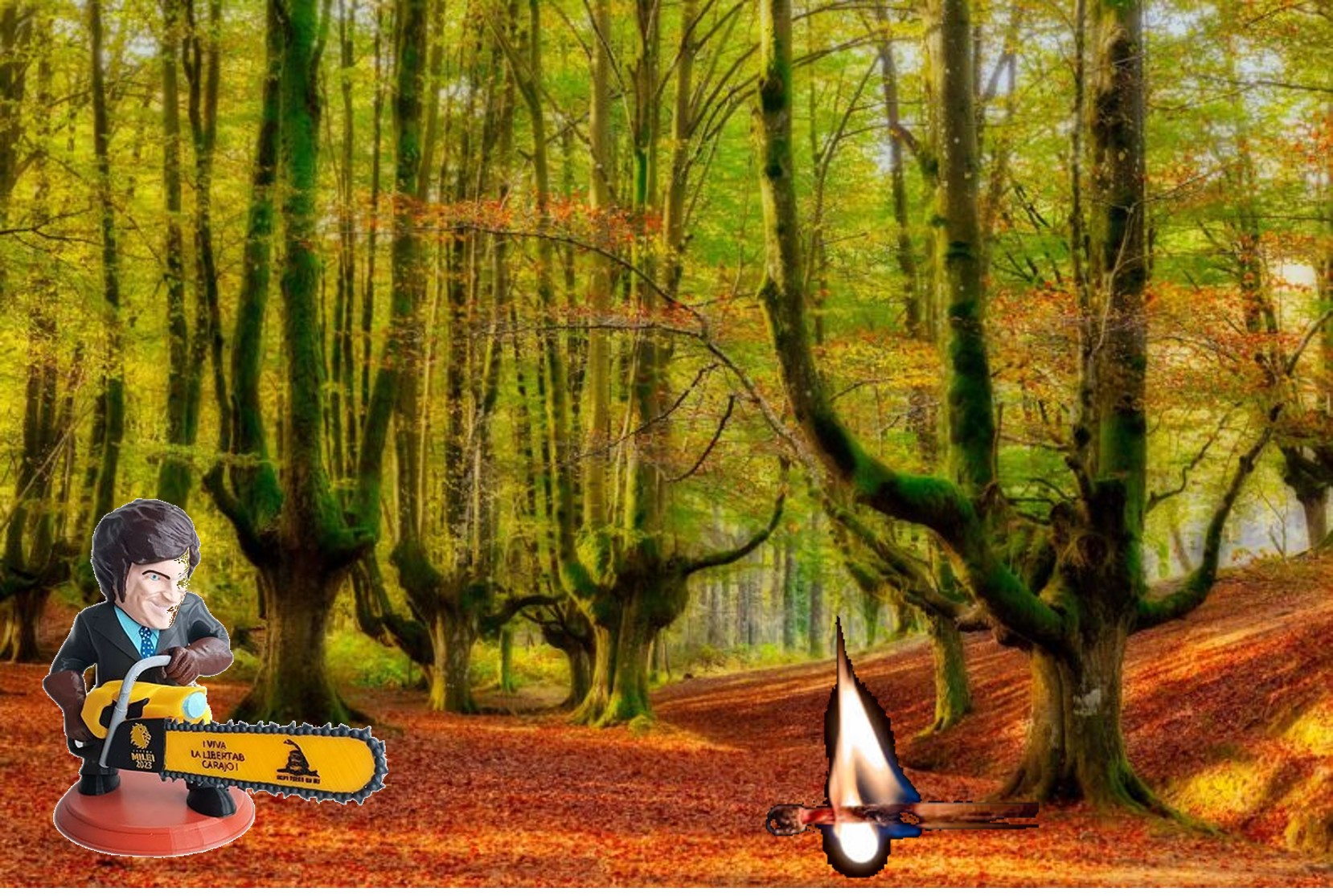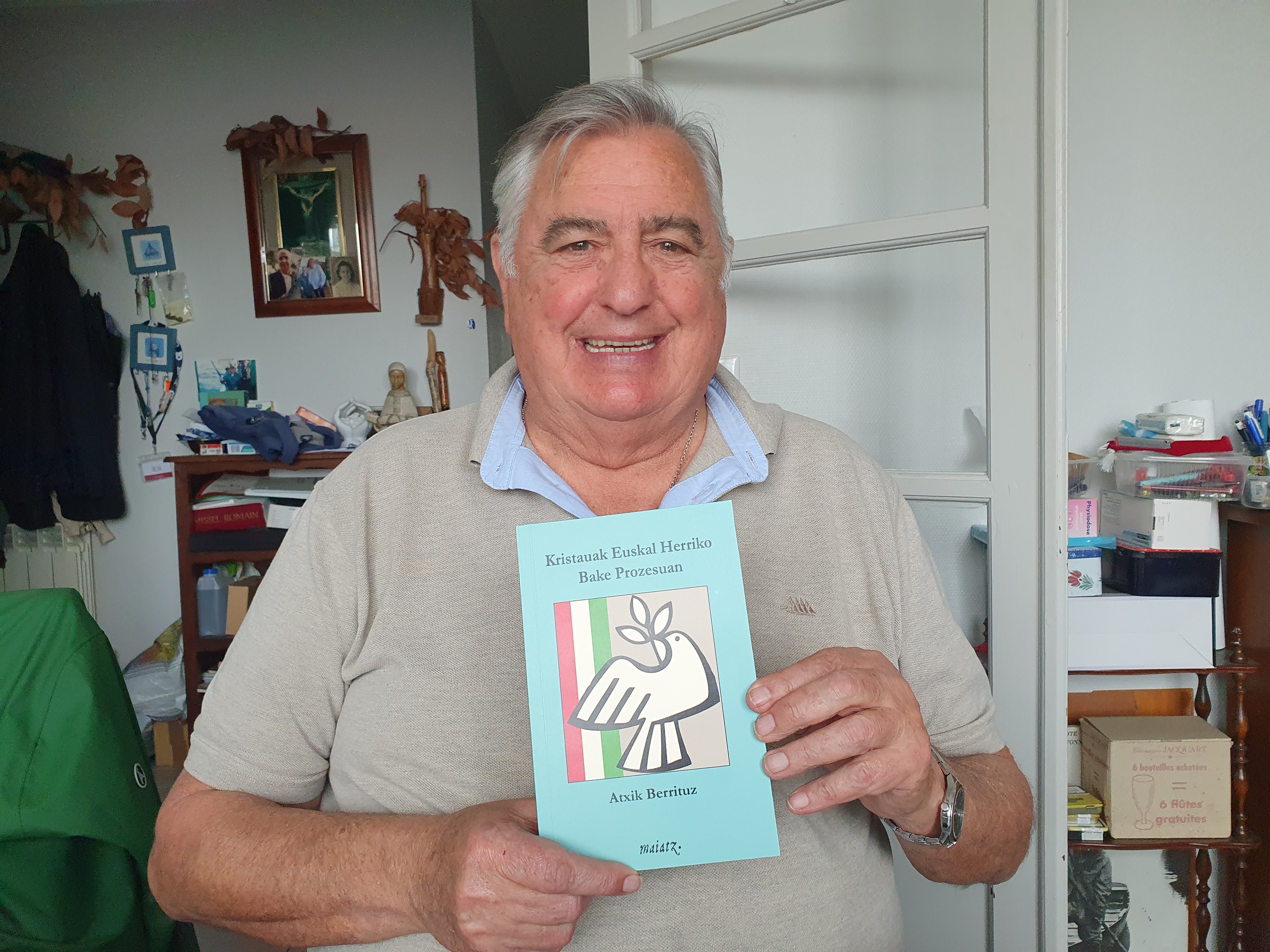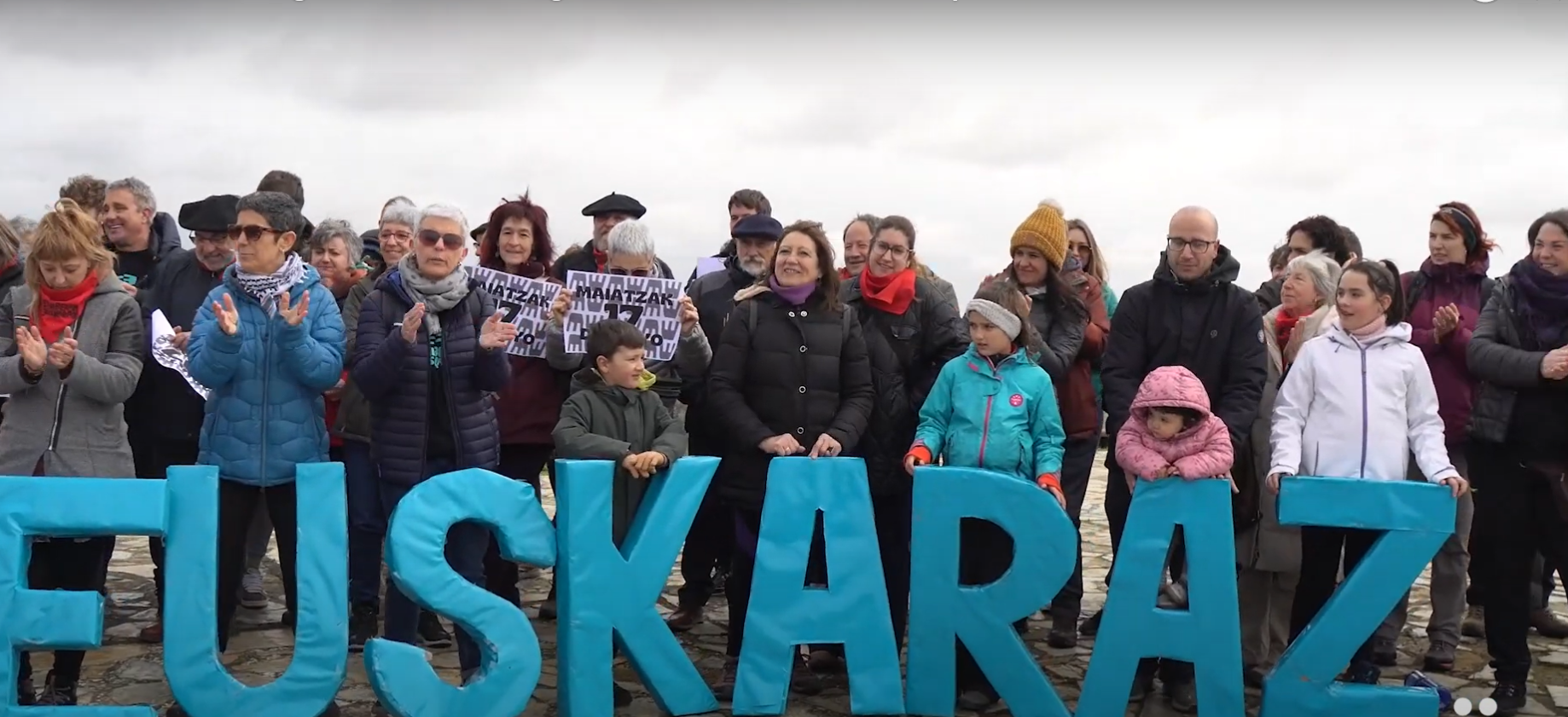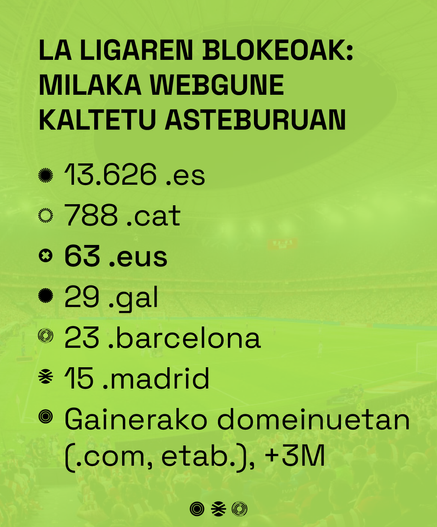The business in crisis, in full creation
- The music industry has hit the bottom. Modes, times, sources of money and business have changed. Also the functions and objectives of the musicians. But music is still music. Some say that the crisis is industrial, that it is not musicians or creators, but the new technologies have turned the lines and each one has chosen the path that has most resembled it. However, all those who appear here agree that Basque music is a rich and varied scene.
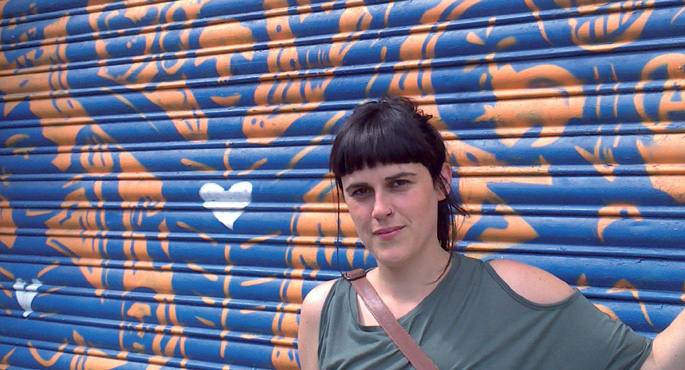
We first talked to María Rivero. He is a singer of the Siroka group and a member of the Taupaka association, which edits the records of the band. The Taupaka is composed of creators and is born with the dissolution of the Muskherria platform. It is not usual to find only creators in a discography or in a musical company, but in this case it is; and besides being musicians, they are creators of different areas: clowns, DJs, photographers, storytellers...
Self-management and Copylefta are the hallmarks of the association. “The Taupaka has just been born – it will be one year in August – and as we move forward we realize how far we should go. Since we are the creators of many areas, we have interesting debates. We don't know what's going to happen in culture, but we know what we don't want. We do not want anyone, let alone SGAE, to manage our work, because we prioritize the right of an entire society, because we are in favour of a dignified and free culture. The ultimate goal is for our music to reach as many people as possible, and that has nothing to do with selling records,” says María Rivero.
For the taupak, creation and management should remain in the hands of the creator, that is, the musicians. “There are many ways to do this, but always in the world of self-management. The current system is not valid either in music or in other areas.”
As for the female role, “the usual thing in culture also happens in music, is a mirror of society. In Okorra, it seems that steps have been taken, and I see the women very calm. Things will not be done, you have to fight.” Rivero responsibly lives gender discrimination: “Women have to overcome many prejudices when it comes to the stage, which do not apply to men.”
Aiora Renteria has been in the forefront of the musical group Zea Mays for over 15 years. I was angry at the low presence of women in the Basque music scene. “There are a lot of people willing to change that,” he says.
ZEA Mays was born in 1998. The picture has changed a lot since then. “When we started, the record companies invested money and the recording, the promotion and the number of records were in their hands. The Internet had no strength. Most groups today have to pay at least the recording, and they normally have to pay everything. Then, for your music to reach the world, you have the Internet.”
So things, and after moving from one record label to another, the group opted for self-production when the release of the album Morphina (2007) became “We have done it naturally, because we love our work, because we want to give our music the greatest possibilities. We have done the best we could do, take on the advantages and disadvantages, although that is a lot of
work.” Aiora Renteria works with several teams and is well aware of the current situation. “I see it healthy, there are a lot of equipment, they are of great quality, of very different styles. All musical styles can be heard in Basque, rap, pop, death metal, rock, punk... before it did not happen. There are hundreds of concerts every weekend, in all kinds of rooms (gaztetxe, bar, plaza...). It seems that everything goes wrong with the crisis, but if we look at it well, it is clear that we have a big and quality offer.” We have the words of the singer of ZEA Mays. “It’s curious what happens. When a festival is organized, those who place the enzenatoki or the team, the electricians, the promoters, the managers, the security, the advertising... live from what they are doing, except those who come up on stage.”
The music under debate
Listen! The project originated in 1996, when a group of young people launched the first musical journal entirely in Basque. It was created to fill the gap that existed in the written press and is edited every two months. The first time he took the first steps he had the support of the Esan Ozenki seal. Over time, he went through several hands. until in 2002, after several months of failure, www.eragin.com took over the magazine. Since 1996 57 numbers have been published, the last in December 2007. Meanwhile, in 2003, the URL0 itself created the portal www.entzun.com and launched the magazine to the network for the first time. The new balancín began to walk with great impetus, but little by little it was taking presence and strength.
“Seeing the growth and convinced that we were immersed in the new era of communication, we decided to put our forces on the web. However, we did not want to give up the paper version and listen! We created a disco-book,” explains Xabier Sagardia, head of the website.
In Sagardia’s opinion, “Basque music does not deserve the space it deserves in the media, especially in the case of Castilian and Spanish media, especially television and radio”. According to the head of Entzun!, the Basque music scene is very varied: “Everything there is is not good, but we have a lot of good things. However, sometimes such a varied character is not reflected enough, or at least some styles take a longer time to reach a larger audience.”
New technologies have led to changes in the field of music. Among other things, it is easier to record, it is also easier to hang on the Internet audio-visual, and to listen or download music from the network. Any day you can record in a home studio and make a spin on the CD. “This also has a positive side, but we have evolved to a large extent towards amateurism. As for creation, in its strict sense, talent, the ability to compose... does not depend on new technologies”, says Sagardia.
The music industry has played its full part, and as a result, music does not reach anyone with the same business. The increase in VAT is the last attack on this shipwreck. “To say that the rise in VAT is essential is to despise culture, but they do not realize, (or perhaps they do), that music, theatre, art, in a word, culture, enriches society and people, grows them. The right has always been afraid of the freedom that culture entails,” says Sagardia.
Direct
In the world of music, more than creation, the ways of doing business have changed. Today, publishing the album does not give any money, the money is taken from the direct ones. Ritxi Aizpuru, head of the label Baga-Biga Musika Ideiak, is well aware of this area. Baga-Biga emerged in 2005 to bring the groups direct, “since the performances of the Urgabe group multiplied at that time, it was an opportunity to manage the groups direct and publish their albums” says Aizpuru. A transformation took place in 2007 and Baga-Biga started a 360-degree cultural policy. Management ceased to be an ordinary record office or house. “We define Baga-Biga as a comprehensive and complete musical office. This is called interactive marketing, and the consumer himself seeks active brand values.”
General vision criteria or 360-degree initiatives have therefore reached the music industry. “The path was to be able to respond fully to the questions and needs of musical groups. Working with music, working with groups, working live,” says Aizpuru. “Baga-Biga Musika Ideiak is only a few years old, but has become a benchmark in the Basque Country. We've published a total of 107 records, and we've organized thousands of shortcuts over the years. We have developed experience, experience, professionalism and training to deliver the best possible results.”
There is also self-criticism. “Not all actions go as well as you want. There are many variables and it stumbles everywhere. ‘worth it’ and ‘space’ are very relative terms. We all deserve the best, we will demand space for everyone, but not everything is possible. Everyone wants merit and space. If it existed, it would be very easy to act. If a group of music doesn't think it's going to eat the world with its music, it won't go far. But we must also be able to be realistic and accept our own shortcomings. Not all songs have the same value. Finding a multiplier effect to songs is the work of the Baga-Biga office,” explains Aizpuru.
Ritxi Aizpuru is a member of Baga-Biga, but was also responsible for Oihuka. Specialist in music, knows the scene, the present and the previous one well. “The music of Euskal Herria always has to be strong, at least that’s what we have to think about. But talents don't arise from minute to minute. From time to time they emerge, other times they are cultivated. A space for criticism and recognition must be found at each time. They must be analysed from a holistic perspective. It has always been plural, but outside, in other countries, they have an advantage of years.”
Ritxi Aizpuru referred to the changes that have taken place in this area, especially those arising from new technologies: “The welfare society has provided us with great advances, but all of them are the favorite words of the capital. Progressive concepts and critical visions are always at our side. All the technical artifacts have given the musician the facility to take advantage of it in the most critical way against this mansa society.”
Euskal musika taldeek behar besteko espazioa dute?
Ez naiz sekula nekatuko Euskal Herriko musika taldeei dena zor diegula esateaz. Horren herri txikia izanik, hemen dugun talde kopurua harrigarria da, eta oro har, maila ere ona da estiloz estilo. Kanpoko musika estimatu eta goresten den garaian, uste dut geure zilborrari pixka bat gehiago begiratu beharko geniokeela, hamarkada pare bat atzerago egin zen bezala. Euskal Herriko musika eszena zinez interesgarria da, gaztea, trebatua eta osasun onekoa. Horregatik, gehiago babestu beharko genuke, argitalpenak eskuratuz, kontzertuetara joanez, banden ekarpenari arreta jarriz.
Urtean argitaratzen diren euskal diskoen zerrenda biltzen duzu. Zerrenda gero eta luzeagoa da, zein diagnosi egingo zenuke?
Azken urteetan, batez beste 300 lan plazaratu dira gurean. Beraz, argitalpenek gora egin dute, batetik, talde askoren lehen urratsa maketa izan beharrean diskoa edo EPa bihurtu delako. Bestetik, aurrerabide teknologikoek grabazioak erraztu dituztelako. Eta Internet ere mugarri izan da lanak sarean jartzeko. Formatuei dagokienez, ohiko jewel box eta digipack formatuek bizirik jarraitzen dute, baina beheranzko joeran daude. Biniloa geroz eta estimatuagoa da, eta formatu digitalak ere berebiziko garrantzia du. Disko ukigarria desagertuko ez den arren, mp3 sortadun karpetak, disko digital gisa ezagutzen direnak, izango dira etorkizuneko argitalpenak. Bestalde, nabarmendu behar da urtetik urtera soinu kalitatea eta sormena maila onean mantentzen direla.
Garaiei lotuta al dago euskal eszena?
Hemengo musika eszena askotarikoa eta aberatsa da, horrela defendatzen dugu Harrobia Lantzen ekimenaren urrats bakoitzean. Musika estiloen oreka gertatu da gurean, eta modak desagertu ez diren arren, estilo oso ezberdinak jorratzen dituzten bandak bizi dira elkarrekin. Ziurrenik rock musika izango da nagusi, baina pop musika (komertziala zein indie gisakoa) indarra hartzen ari da. Noski, skacore dantzagarriak herriko plazak betetzen ditu eta nerabe iraultzaileen gustuak bereganatzen. Punk eszena ere badago, bereziki Gipuzkoa eta Bizkaian. Musika beltzak ere badu lekua, hazten ari den reggae eta hip hop korronte interesgarriari esker. Aldiz, heavy metal musikak iraganeko oihartzuna apaldu eta oreka egoki bat topatu du, taldeek zein zaleek gustuko dutena. Azkenik, musika tradizional edo folk kutsukoak ohiko leku garrantzitsua mantentzen du gurean.
Duela gutxi sortu da euskal musikarien elkartea. Nork hitz egiten du musikarien izenean?
Elkartzea ezinbesteko bihurtu da, kulturan ez ezik, baita beste alorretan ere. Hori horrela, erabat normala da musikariek bat egitea, diskoetxeek bat egitea, musika eragileek bat egitea… Musikariei dagokienez, beraien eskubideak defendatzeko tresna egokia izan daiteke elkartea. Baina ondo definitu behar dira eskubideak. Musikariek gainontzeko langileen eskubide berberak dituztela esaten dute maiz. Alegia, okinak ogia egiten duen bezala, musikariak abestiak egiten dituela. Nire ustez, hori ikuspegi okerra da. Gainera, Espainiako SGAE elkartearen defendatzaile sutsuen tesiak etortzen zaizkit gogora. Musikarien ekarpena ofizio batetik harago doa, kultura sortzen baitute. Horrek ez du esan nahi kobratu behar ez dutenik, baina helburua ezin da izan kobratzea. Horregatik, ikusten dudanean musikari bat “errespeta nazazu, ez dut doan jotzen” esaka, urdaila nahasten zait.
Euskal musikariak elkartuta daudela uste duzu, dena den?
Eskubideak defendatzeko orduan, ados jarriko dira, seguru. Diru kontuetan zailtasun handiagoa ikusten dut. Maila apaleko taldeen artean gertatzen dena jarriko dizut adibide gisa. Talde asko kexatzen da beraien kontzertuetara ez delako jenderik etortzen. Baina talde horietako zenbat hurbiltzen dira beste taldeen kontzertuak ikustera? Babesaren aferan galdu egiten dira banda asko, eta horrek agerian utz dezake zer nolako harremana izan dezaketen elkarrekin.
Nola ikusten duzu musikarien lan egoera?
Musikatik bizi direnak oso gutxi izango dira gurean. Ehuneko oso txiki bat izango dira horiek. Egia da musikari askok beren afizioa, eta ez ofizioa, antzeko lanekin uztartzen dutela. Esaterako, musika irakasleak dira asko, edo kulturaren eremuan aritzen dira lanean. Baina aurrerago esan bezala, nik ezin dut alderatu abesti sortzaile bat makina saltzaile batekin. Musika ez dut ofizio bezala ulertzen, lan normal bat izan daitekeen arren, zilegitasun osoz.
You may not know who Donald Berwick is, or why I mention him in the title of the article. The same is true, it is evident, for most of those who are participating in the current Health Pact. They don’t know what Berwick’s Triple Objective is, much less the Quadruple... [+]
The article La motosierra puede ser tentadora, written in recent days by the lawyer Larraitz Ugarte, has played an important role in a wide sector. It puts on the table some common situations within the public administration, including inefficiency, lack of responsibility and... [+]
Is it important to use a language correctly? To what extent is it so necessary to master grammar or to have a broad vocabulary? I’ve always heard the importance of language, but after thinking about it, I came to a conclusion. Thinking often involves this; reaching some... [+]
The other day I went to a place I hadn’t visited in a long time and I liked it so much. While I was there, I felt at ease and thought: this is my favorite place. Amulet, amulet, amulet; the word turns and turns on the way home. Curiosity led me to look for it in Elhuyar and it... [+]
Adolescents and young people, throughout their academic career, will receive guidance on everything and the profession for studies that will help them more than once. They should be offered guidance, as they are often full of doubts whenever they need to make important... [+]
Atxik Berrituz giristino taldeak Kristauak Euskal Herriko bake prozesuan liburua argitaratu du Maiatz argitaletxearekin. Giristinoek euskal bake prozesuan zer nolako engaiamendua ukan duten irakur daiteke, lekukotasunen bidez.
Maiatzaren 17an Erriberako lehenengo Euskararen Eguna eginen da Arguedasen, sortu berri den eta eskualdeko hamaika elkarte eta eragile biltzen dituen Erriberan Euskaraz sareak antolatuta











